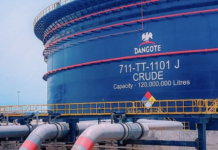
.
· 18 Roads, Bridges earmarked for completion within 12-15 months across the country
Lagos-Ibadan, Abuja-Kaduna-Kano, 2nd Niger Bridge, Ilorin-Jebba, Jega-Tambuwal-Sokoto and Enugu-Port Harcourt, among the list
The Ministry to take as priority the maintenance of Bridges to avoid further deterioration
Also selects 2 roads and a bridge geopolitical per zone for enhanced funding
House Committee Members commend Minister for commitment, dedication in pursuit of infrastructure development
The Federal Government will focus on the completion of ongoing road and bridge projects in the country rather than beginning new ones, in the implementation of the 2021 Budget, the Minister of Works and Housing, Mr. Babatunde Fashola, SAN, has said in Abuja.
Fashola, who spoke during the defense of his Ministry’s proposals in the 2021 Budget; listed roads whose completion would be prioritized during the budget year to include those categorized as A1-A9 adding that 18 of such road projects, which have reached appreciable level of completion have been identified across the country for completion within 12 to 15 months.
The roads and bridges, the Minister said, include those leading to the ports and major agricultural hubs across the six geopolitical zones of the country adding that the decision to prioritize those projects was in line with the mandate of President Muhammadu Buhari, whom, he recalled repeatedly emphasized the necessity to focus the Budget on completion of projects.
According to him, other categories of road and bridge projects on which the Ministry will focus for completion during the budget year also include those that have attained 70 per cent completion adding that subject to the availability of funds, such projects would be completed as early as possible.
The Minister, who was accompanied by the Minister of State, Engr. Abubakar Aliyu, the Permanent Secretary, Mr. Ernest Umakhihe, Directors and other top Ministry officials, said the Ministry would also focus on the maintenance of about 50 Bridges nationwide as a measure to avoid further deterioration of the structures, which he described as critical.
Pointing out that some bridges which connect several geopolitical zones and Federal roads had not been maintained for several years before this administration, Fashola added that some of the Bridges required replacement of expansion joints and hand rails while others required major underwater repairs of exposed piles, pile caps and piers.
“Bridges like the Third Mainland Bridge, the Koton Karfe Bridge and the Makurdi Bridge are part of about 50 bridges being rehabilitated simultaneously among others”, he said adding that the Ministry also had its focus on the completion of the construction of Chanchangi Bridge along Takum-Wukari Road in Taraba State and Ikom Bridge along Calabar-Ikom Road.
Expressing the need for the support of the National Assembly in realizing the stated objectives, Fashola, who put the estimated cost of rehabilitating all the bridges at N80.984 billion, however, pointed out that there was need, in the course of each year, to address washouts and erosion envisaged with the subsiding discharge of flood waters nationwide.
“We are mindful of the limitation of resources but the frequency of these natural disasters caused by Climate Change and aging infrastructure must compel us to think of making provisions for emergencies”, he said adding that the international Best Practice for such Emergencies was between 5 and 10 per cent of the Capital Budget.
Fashola, who said the Ministry has also selected two roads and a bridge in each of the six geopolitical zones for enhanced funding during the budget year, also listed for adequate funding the Federal Government of Nigeria’s Counterpart Fund for projects financed by the China Exim bank.
On the Ministry’s interventions on internal roads in Federal Tertiary institutions across the country, the Minister, who said out of the 43 such projects 18 had been completed, explained that inadequate budgetary provisions had stalled the projects which, according to him, the Ministry started since 2018/2019, adding that the 17.35 percent cut in the 2020 Budget made it impossible to pay Contractors who were being owed N3.31 billion while the money required to fix the remainder is N3.54 billion.
Reiterating that the major challenge of the Ministry in completing ongoing projects on time was inadequate budgetary provisions, the Minister explained further that aside the fact that the funds were inadequate, there was also the problem of timely release of funds to sustain annual cash flow requirement level adding that although funds from the Presidential Infrastructure Development Fund (PIDF) and SUKUK Bond had helped to bring some funding relief, the Ministry’s exposure had continued to expand due to annual addition of new projects.
He said although the sum provided for Highway projects in the 2021 Budget was an improvement over the 2020 Budget provision for the Sector, it was still inadequate to address the funding challenges of Highway projects pointing out that with about N1.2 Trillion as the Year 2021 projected cash flow requirement, funding for works planned to be executed on the projects in 2021 would have to be “efficiently optimized”.
Fashola said in order, therefore, for his Ministry to make significant impact in the improvement of the Federal road network and boost the nation’s economy, there was urgent need to enhance the release of funds for the projects under the Amended 2020 Budget to defray the outstanding payments; enhance Budget ceiling for Highway projects in the 2021 Budget proposal to cover the execution of works during the year and leverage on other alternative funding sources as well as make provision for emergencies to enable Government respond to damage and destruction caused by natural disasters, Climate Change and other unforeseen events.
The alternative funds, he explained include the Presidential Infrastructure Development Fund (PIDF), which is being used to rehabilitate, reconstruct and expand the Lagos-Shagamu-Ibadan Dual Carriage way, Construction of Second Niger Bridge and rehabilitation of Abuja-Kaduna-Zaria-Kano Dual Carriageway.
They also include the SUKUK BOND being used to fund a total of 44 road and bridge projects, which are mainly dual carriageways on major arterial routes A1-A9 on the Federal road network using the 2020 Sovereign SUKUK Issuance and Tax Credit Scheme being used in the construction of Bodo-Bonny Bridge across Opobo Channel in Rivers State and the construction/rehabilitation of Lokoja-Obajana-Kabba-Ilorin Road Section II in Kwara and Kogi States, among others.
On the issue of delay in project completion raised by Committee members during the interactive session, the Minister said aside the twin challenges of inadequate funding and delayed releases, there was also the fact that some of the roads carry heavy traffics which had to be managed while construction, reconstruction or rehabilitation was going on adding that it was necessary to put some measures in place for the safety of both the workers and commuters.
The Minister told them, “When we talk about delay of projects, I would have loved you to have specifics of what is considered as delays. It is important to understand what happens at the construction site, especially on highways where we are reconstructing and commuters still have traffic”, adding that ideally on a construction site traffic should be shut down.
He cited as examples the Third Mainland Bridge in Lagos with an average Daily Traffic (ADT) of 122,978 vehicles, the Koton Karfe Bridge with Average Daily Traffic of 11,942 vehicles and the Makurdi Bridge adding that the Lagos-Shagamu-Ibadan carries the heaviest daily traffic in the country followed by the Abuja-Kaduna-Kano Road.
On why the SUKUK could not be expanded to fund other road projects as a means of overcoming the problem of inadequate funding, he explained that at every issuance there was a specific amount which the Government could withdraw adding that no money would be left as reserve SUKUK fund.
In his contribution during the session, the Minister of State, Engr. Abubakar Aliyu, explained that the seeming delay in the completion of some of the road projects in the North East was as a result of security challenges citing the Yobe-Maiduguri Road where insurgents attacked the CCECC and burnt their equipment.
Some of the Committee Members, including the Chairman, commended the Minister for his commitment to and diligence in the pursuit of the Presidential mandate of Infrastructure Development across the country.





